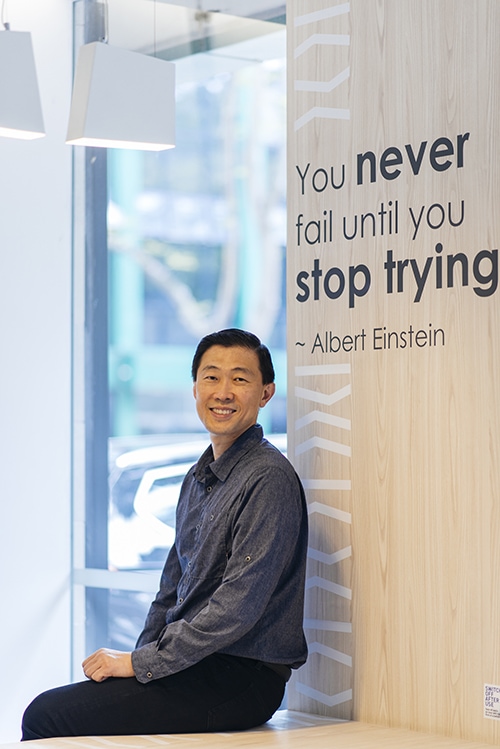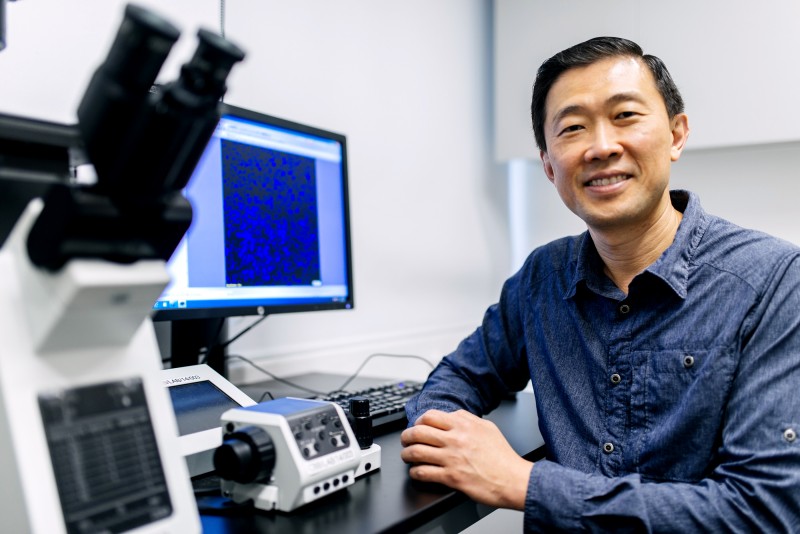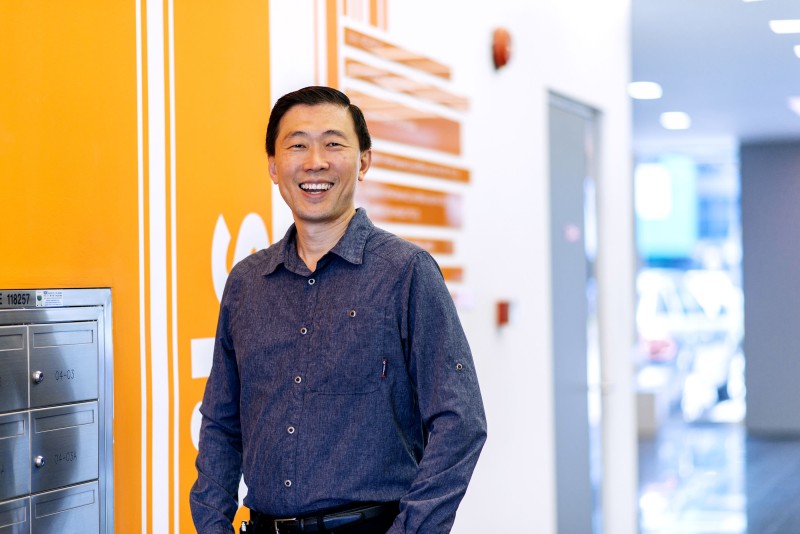Dr Steven Fang has a lot on his plate and shoulders. I know so because of the rate his schedule gets booked. But it’s finally my turn as I await his arrival at the newly-launched BLK 79, in collaboration with SPRING Singapore and JTC as the extension to BLK 71. The One North campus wants to be the Silicon Valley of Singapore, and Dr Fang has been tasked to help fulfil that vision.
The building, still under renovation, already houses one of his offices. He had previously pioneered cord blood banking in Singapore with CordLife Group, a SGX-listed firm. Nowadays, he’s turned his attention to giving back to the local entrepreneurship scene, like many others who had made it, and become mentors and wisdom-bearers for a younger generation of entrepreneurs. “A few times, it almost broke me,” he recounts his entrepreneurial journey. “In the process, I became deeply religious.” He is soft-spoken but in a matter-of-fact, firm way.
As both Singapore and the South East Asian region gain ground on the world stage with its sizeable 650 million population hungry for all varieties of web and mobile services, especially ecommerce, investors from around the world arrive en masse, hoping to get in on the action. According to a report by Preqin and SVCA, about half of all venture capital deals were done in Singapore in 2013 – S$580 million, as compared to about S$1.1 billion for the rest of South East Asia. The Singapore Government is also well aware of the need and importance of fuelling the innovation required to secure the future of Singapore.
Conversations with Dr Steven Fang
YONG HUI YOW: How did CordLife get started?
STEVEN FANG: CordLife started due to a need I saw in the industry. Back then, stem cell therapy was still in its early days. I was working in the US, and when I returned to Singapore, I started looking at similar types of available options. Surprisingly, I found that there wasn’t any. This discovery, or lack thereof, was particularly memorable for me. Also, at that time, one of my colleagues was infected with leukaemia, and they were one of the early beneficiaries of cord blood transplantation. Out of that experience, I decided that this [CordLife] was going to be both interesting and a viable business in Singapore. That’s when I decided to look at the different ways in which cord blood banking can be offered to people who needed them.
YONG HUI: What happened next?
STEVEN: So as with most entrepreneurs, it started with me funding it with a couple of doctor friends, as well as like-minded investors who put together the funding necessary to get the company going. A lot of it was my own personal financial resources from the sale of my house and so on.
YONG HUI: Were you already married then?
STEVEN: Yes, I was, and with 3 kids too. My youngest, now already 14 years old – she was just born back then.
YONG HUI: How difficult was it starting a business with a young family?
STEVEN: It’s really a trade-off of lifestyles. You just eat less at restaurants, live in a less nice home, go on fewer holidays and so on. But frankly, these are the easy parts. The most difficult part was growing the company, because after that, we faced rounds after rounds of challenges, both operationally, and financially.
A few times, it almost broke me, but what got me through, was the belief that it was something that needed continuity – I wanted to be able to save lives.
YONG HUI: Was there any point in time when you wanted to throw in the towel?
STEVEN: Yeah, there were at least 3 or 4 times where we encountered very significant challenges. Those challenges had to be solved using different methods and approaches, and really came down to resolve, and how you see yourself as being of value to society. I strongly felt that what I was building was bigger than me, despite all the challenges. A few times, it almost broke me, but what got me through, was the belief that it was something that needed continuity – I wanted to be able to save lives.
YONG HUI: What was the best thing that came out of it?
STEVEN: Along the way, I made a lot of good friends, and I also became really religious actually, because the resolutions to many of those challenges, seemed to have come at the ‘right’ times. I feel very blessed and thankful to have gone through those challenges, some of which were not small at all.
YONG HUI: How crucial was family support as you went through those times?
STEVEN: Family support is definitely important for any entrepreneur who chooses to take on difficult things. I think, if you choose to do something easy –- this is not to say that it’s not good to be doing it, but, the challenges multiply as you take on more difficult and challenging businesses, and CordLife was one of them. Family support is important, to give one the mental mindset to be able to meet the challenges ahead. I mean, to put yourself in the shoes of the entrepreneur, it’s hard enough to try and overcome so many financial and operational challenges, the last thing you want the family to say is “This isn’t working out”, or “The family needs a different kind of attention now.” So I’m very thankful that my wife and children have been very supportive of me this last 13 or 14 years.
YONG HUI: How different is it starting out then and starting out now?
STEVEN: The environment has definitely changed a lot since 15, 20 years ago when I was doing it. There is definitely more assistance now. However, the challenges remain the same. In fact, the challenges today are far more complex than 20 years ago with the advent of new technologies, and the speed in which innovation comes about. A lot of these technology-based businesses are still challenged to go-to-market. If you don’t, someone else with similar technology, are probably not far behind.
Technology can now enable your competitors to catch up with you very quickly, so it’s a great equaliser.
YONG HUI: So the difference is primarily that there a lot more competition now?
STEVEN: See, technology can now enable your competitors to catch up with you very quickly, so it’s a great equaliser. Today, the complexities revolve around bringing the technology to market, and the speed in which you can do that. It’s also about being able to secure the market share that you have built up.
YONG HUI: After stepping down from CordLife in 2012, why did you join Clearbridge Accelerator?
STEVEN: The attraction of Clearbridge for me is that it’s focused on med-tech and bio-tech – areas which I love, and will continue to invest in. The model of Clearbridge is also appealing to me, because it offers both GP and LP participation, which means, for me, I’ve invested in the fund, but more importantly, it also allows me to participate in the management of some of the investee companies. So I have invested in 12 companies through the fund, and I’m able to participate and help grow them. It was the best of both worlds for me.
YONG HUI: How many companies stood out to you?
STEVEN: We have at least 3 companies which are really outstanding in our portfolio. Sometimes, it’s a question of timing, and other times, it’s a question of priorities. When I say outstanding, what I mean is that these companies have opportunities for an M&A, or IPO over the next few years.
Start-ups, by that very definition, have always been very challenging. Having a good idea, but a lack of talent, or talented people to run it, is to say the least, very difficult.
YONG HUI: Do you think there is a lack of talent in Singapore?
STEVEN: I think that for any start-up or SME, or even MNC, for that matter, having access to talent has always been a challenge. But for start-ups, these challenges are multiplied many-fold, because not only do they have to be mindful of the talent pool, they also need to prove their market, prove their technology, get the financial backing behind it, and execute well. Start-ups, by that very definition, have always been very challenging. Having a good idea, but a lack of talent, or talented people to run it, is to say the least, very difficult.
YONG HUI: Tell us about the newly re-launched ACE.
STEVEN: Over the past ten years, ACE has been a movement, but there was no physical entity behind it. As of late last year, that changed when we formed a legal entity, a non-profit organisation, funded by the government, but led by private individuals. On the board of trustees, are myself, and 19 other individuals, who provide their volunteer time, to help in the running of ACE.
YONG HUI: What are the aims of ACE?
STEVEN: ACE has three cornerstones, or foundational pillars. First, is to represent the voice of entrepreneurs. We want this to be the Silicon Valley of Singapore, where entrepreneurs gather. This [BLK 79, BLK 71] is a location meant to be the hub of entrepreneurship in Singapore. We want to, through our activities and involvement in the community, to have an on-the-ground sense of the voice of the entrepreneur. Second, we are here to build this community. The activities that we’ll launch shortly, will centre around entrepreneurs meeting other entrepreneurs, funders, or companies. At the same time, we want to help give birth to start-ups more regularly. The third pillar is youth entrepreneurship. We are putting in a lot of time and effort to make sure that we have a good deal of growth coming from our youths. One of the programmes which will be announced later this year, is the Junior World Entrepreneurship Forum, where we’ll see some of the largest collection of junior entrepreneurs come together.
YONG HUI: From Singapore?
STEVEN: From all over the world.
YONG HUI: What are the biggest hurdles for entrepreneurs in Singapore?
STEVEN: Other than a critical mass of talent, the hurdles still seem to gravitate towards funding. There is a big funding gap in our ecosystem, which is why I’m creating an alternative funding platform, together with the Singapore Stock Exchange (SGX) to see how it can best plug this gap. These two, are the main challenges I would say – talent and funding.
YONG HUI: How do you think the talent issue can be helped?
STEVEN: Some companies I’ve observed have tried to resolve it by going global. Talent pool these days can be halfway around the world. They don’t have to sit in Singapore, in your office. The very important thing however is that, you have to be able to work with them, and hold on to them once you get them.
YONG HUI: Who are you targeting for your new funding platform?
STEVEN: That platform will focus less on start-ups, and more on established, mature companies, that have sales and products in the market – but may or may not be profitable. There is a huge funding gap between Series A and Series C, where the company is neither a start-up nor a MNC, so it’s in between, kind of like an early SME, but not quite. That’s where we’re targeting our assistance and interest to raise funds for.
YONG HUI: So they can be brick-and-mortar businesses also?
STEVEN: Absolutely. They can be brick-and-mortar businesses… we are also talking to apps companies, traditional companies — the whole range of them.
YONG HUI: When is it launching?
STEVEN: We are targeting to launch it in the middle of this year. We are hoping to onboard early campaigns probably in the early part of the second quarter this year, spilling over to the third quarter. A lot of it will depend on regulations. So, I will be working very closely with the government to make sure that all the requirements are fully complied with.
YONG HUI: Who will be the investors on this platform?
STEVEN: We have private equity firms, institutional funds, private banking clients, home offices, as well as venture capital and private investors – everyone. Our focus first will still very much be on accredited investors, not the man on the street, yet.
YONG HUI: Will this be a web-based platform?
STEVEN: For now, yes. For this, there will be activities that will still need to happen offline to sort out many of the details.
YONG HUI: What are the hottest areas in bio-tech at the moment?
STEVEN: There is resurgence in the drug development side, which had gone quiet for awhile due to the costs of development. MedTech is also seeing resurgence with big data, as the new tools make it possible to sequence tumours and cancer cells. This is called ‘Next Generation Sequencing’ (NGS). We are now able to precisely determine which drugs work for which patients, and for what conditions using NGS.
YONG HUI: And what’s gotten out of favour?
STEVEN: Stem cell therapy seems to have quietened down – it used to be the flavour of the month. I think a lot of it has to do with that there haven’t been a lot of significant breakthroughs in the field recently.
YONG HUI: What do you think of cryogenics?
STEVEN: There is not enough science behind it. Full body preservation is not fully developed yet, and coming from a medicine and science background, until the data is compelling, we shouldn’t really be going out there offering such services. Cryogenics of tissues, however, has been around for a long time, and there is a bigger market for that.
YONG HUI: Who are some of the local entrepreneurs that you look up to personally?
STEVEN: Richard Eu, is one, and he’s a very good friend. We sit on numerous committees together. Wong Ngit Liong from Venture Corporation – very good guy. We get together on a regular basis, and catch up separately. These are people I look up to very much.
YONG HUI: Are employers now more willing to see entrepreneurial experience as valuable, as compared to before, and so in a way, it’s less of a risk now.
STEVEN: Most definitely, as compared to ten years ago. I think entrepreneurship is now a high – second or third choice for an alternative career, rather than taking a job at an MNC. I see this as a continuing trend.
YONG HUI: What do you aspire for your children?
STEVEN: It would be for them to find their own dreams, for them to realise what they want to give back to society. That has always been my advice to them.
A businessman is just someone who does business, but an entrepreneur is someone who wants to do good for society
YONG HUI: Did you know you’d become an entrepreneur as a kid?
STEVEN: I come from a family of businessmen so it runs in the family. Again, I do not put this to my children – they are free to choose. But growing up, for me… I always knew I would be an entrepreneur, not a businessman… there is a difference. A businessman is just someone who does business, but an entrepreneur is someone who wants to do good for society.
YONG HUI: What is the legacy you want to leave behind?
STEVEN: For the last 27 years… the legacy that I want to leave behind, and I’m still working on it, is to be able to bring novel medical technologies to the market to help save lives – that has always been my aspiration.




